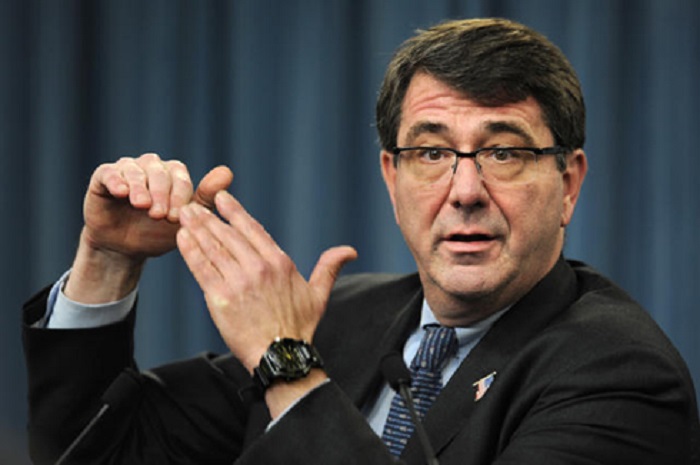Alwaght- On Thursday, the representatives of over 30 countries, all members of the US-led international anti-ISIS military coalition met in Washington to talk defeating ISIS terror group. They finally concluded a strategy to destroy the terrorist group, according to the US Secretary of Defense Ashton Carter.
According to the new pathway that was finalized during the meeting, ISIS' terrorists would be encircled in their strongholds in Syria’s Raqqa and Iraq’s Mosul in order to be targeted in next step.
Meanwhile, Washington is appearing to be in a hurry to cleanse Mosul of the militants of ISIS. Concerning this White House's policy a couple of points need to be taken into consideration. The US has no remarkable gains in its anti-terror record. As it is clear, during the recapture of Iraq’s Fallujah, it was the Iraqi army and the popular forces known as Public Mobilization Forces (PMF) that played the major role. Furthermore, even in 2006 the US failed in its attempt to recapture Fallujah from militants that were conducting assaults at its forces from there. Now and after the earlier failures, Washington seeks liberating Mosul in a bid to seize the honor of liberation of the ISIS-held city.
When the talk was about taking back Fallujah from ISIS, the US was against the plan, arguing that the priority was to liberate Mosul. This came while for the Iraqi government the top goal was recapturing Fallujah at that time. On the other side, despite investment on the Syrian Democratic Forces, a force majorly formed from the Kurds of Syria, Washington has failed so far to reclaim Raqqa, the city which is known as hotbed of ISIS in Syria, from the terrorists. Moreover, the US-backed forces after two months have not managed to totally cleanse the city of Manbij in Aleppo in Syria’s north.
Such failures in efforts have made Washington suffer in Raqqa and Manbij, pushing it to rush to start Mosul recapture battle to raise itself as the leading force in liberation of the Iraqi city.
This American approach has something to do with the upcoming US presidential election due in November. Actually, the US is an ally of Iraq according to the security pact between Washington and Baghdad, however, it hasn't done its part in practice to fight terrorism in the country. This is why that as the election is drawing close, Washington seeks a place and a role in Mosul’s decisive war.
On the other hand, the Americans are highly trusting the Iraqi forces, and actually they are almost sure that Baghdad would win the battle of Mosul over the terrorists of ISIS, because during Fallujah recapture operation, the Iraqi forces showed perfect potentials to take on ISIS. Perhaps Fallujah was the most significant test battlefield for the Iraqi forces.
Meanwhile, the neighboring Iran holds a key role in anti-terror activity in Iraq. The Islamic Republic proved that it had the upper hand in backing the PMF as the battle unfolded in Iraq. There is no direct coordination between Tehran and Washington over fighting the terrorists in Iraq, however. But there is indirect coordination via the Iraqi government.
It must be taken into account that Mosul is the second largest city of Iraq, home to over 2 million people as its population. A large part of Iraq's borders with Syria and Turkey are shared in Nineveh, whose capital is Mosul. Other borders with the neighboring countries are located in Kurdistan region. Therefore, Mosul is politically, economically, and geographically important for the Iraqi government.
On the other side, because only ISIS' forces are now in control of Mosul, the possibility of success of Iraqi forces is very high. In other words, in the whole Iraq, just unlike in Syria, only ISIS is existing, and this makes fighting it easy for Baghdad.
In Syria, however, the US and Western alliance consider some terrorist groups as moderate forces, and so refrain from striking them. This makes anti-terror fight quite difficult in Syria.
The Iranian officials criticized this Western position, arguing that the West must come clean in term of its stances on battling terrorism. In fact, Tehran says that it is not possible for the West to on the one hand support the takfiris and fight other groups on the other hand.
Additionally, Saudi Arabia has been supporting the takfiris fighting the Syrian government both formally and informally. Although recently it claimed that it is not backing them, the general sense is that Riyadh is a major backer of ISIS terror organization. There are circles in the US that accuse Saudi Arabia of offering support for the terrorists in the region. Recently, the Democrats nominee for the presidential race Hillary Clinton has said that there were sides in Saudi Arabia that supported ISIS.
Finally, once ISIS is pushed out of Mosul, only in Syria and Iraq borders some terrorist forces would remain resisting in a sporadic way, and cleansing other places would not be strenuous. Actually, following recapture of Mosul, the Iraqis very quickly could clean up other regions.
Now ISIS access roads from Iraq to Syria are blocked, because it has the Kurdish forces ahead, so it has to move to Iraq’s Kurdistan or Turkey.
It appears that Kurdistan region would not allow ISIS' forces to move there, however, the movement to Turkey is likely for now, because despite the latest developments in Turkey, Ankara has shown no intention to change foreign policy concerning fighting ISIS, with its borders still open to the terrorists’ moves.



























